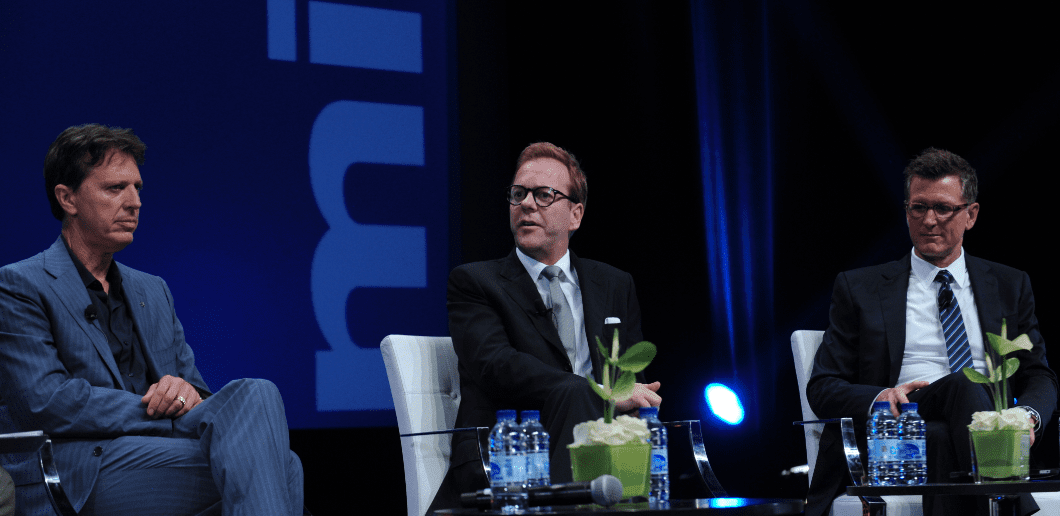There was a buzz of anticipation in the Grand Auditorium for the Media Mastermind keynote session today. Fox Broadcasting Company’s president of entertainment Kevin Reilly took to the stage first, talking about his firm’s strategy and view of the evolving media market. He was then joined by creator/writer/executive producer Tim Kring and actor Kiefer Sutherland for the second half of the session to discuss their new show Touch.
Mark Kaner, president of 20th Century Fox Television Distribution introduced the session, reminding the audience that Reilly has launched “countless” shows over his career, making his first mark by developing ER, and subsequently bringing The Sopranos to television. A stint as president of NBC Entertainment ensued, overseeing The Office, 30 Rock, Heroes and The Biggest Loser among other shows, before he returned to Fox for his current role.
“He’s in charge of all social media initiatives and all of our digital initiatives, and he really is pushing our new business going forward,” said Kaner, before Reilly strolled on-stage to begin the keynote.
Reilly began by saying he continues to be inspired by moments of creative innovation, and by the idea of having a foot in each world: the talent that creates the product, and the business that distributes and makes money from that product.
“I love talent (actors), because they’re passionate. They can be emotional and irrational and unpredictable, but that’s okay,” he said. “However, in business we like things to be quantifiable and predictable. I don’t really want my head of finance to be passionate and emotional…” So moving a creative idea through this system, while retaining a spark of eccentricity and imagination, is his favourite task.
“What makes an idea viable versus what’s needed to make it original?” he continued. “For all the ambition and good intentions, far too often we end up with conventional product and organisations that can’t re-imagine their futures. How can that happen at a time when we need that most?”
Reilly moved on to a discussion of what creativity is, saying that the contradictory process is wired into our very nature: creativity is “a reversing of gears: to know and to unknow, simultaneously”. Which requires liberating ourselves from the established rules – often a hard task.
Reilly said he’s often asked how he can be sure that a particular show is going to be a hit. “The truth is, in some ways, the less I am sure, the more excited I am about the possibilities,” he said, before moving on to the subject of research.
“We often look to research to guide our decisions,” he continued. “I’ve seen it accurately identify a breakout hit like ER that many executives didn’t understand at first.” But… “Had I relied solely in research results, I would never have gone forward with some of the hit shows that I’m most proud of. The Office was a horrificially testing pilot!” British fans didn’t get it, and US viewers found it boring.
“When we tested Glee for example, we got the same result four times: It was a show nobody liked… It seemed to be rejected, and therein lies the problem. When you poll people about what they want, they don’t know how to tell you about what they want… when they can’t yet reimagine. Steve Jobs makes products that people never knew they couldn’t live without.”
“Creative incubation requires open-ended, uninterrupted time to step away from a problem we’re trying to solve,” he continued, while warning that business today is driven by “more, bigger, faster”. Thus, it’s important to actively schedule time for innovation.
So how is the media ecosystem evolving? “Our business is changing and more challenging than it’s ever been,” he said. “The marketplace is fragmented. Consumer behaviour is evolving amidst an explosion of new technologies… People want choice, mobility and free. We’re no longer just competing against other channels.”
However, Reilly said that for all this upheaval, “the web is showing its limitations“, with the value of premium TV content still creating emotional connections with viewers. “Potent TV franchises can migrate across all technologies and behaviours… they need us and we need them… The future isn’t either traditional or digital: it’s a feedback loop between the two.”
Reilly talked about audiences starting to use filtering mechanisms and social networks to decide when to watch TV shows (and which ones to watch). “Last week, Facebook kicked social TV into high gear,” noted Reilly.
“Today our network business model has been set up to count impressions. What we haven’t put enough thought into is how to count expressions… It’s how creative we are in engaging those fans and keeping them connected, even as they move away from the traditional network, that will determine how potent and powerful the networks are in the future.”
New comedy New Girl was pre-released for free on iTunes and video-on-demand services a fortnight before the official premiere. “We had over two million downloads for the two weeks prior to air,” he said, pointing to positive reaction on social networks. “We spiked in both viewer awareness and intent to view… The show opened with the biggest comedy ratings Fox has had in over 10 years.”
Reilly unveiled an extended trailer of the new Kring/Sutherland show Touch at this point in the keynote, before sitting down for some questions with journalist Kate Bulkley, as well as show creator Kring and star Sutherland.
“I didn’t expect to come back to television as quickly as I have,” said Sutherland. “There were some films that I wanted to do, some things I was developing… I got a call from Peter Chernin and a call from Kevin, who both asked me to take a look at the script. And I said ‘I’m really not anticipating going back to work at this time, so I don’t wanna waste your time’. And they told me ‘Just read it…'”
Hence the show, which Sutherland knew he wanted to do after reading 25 pages. “It’s a genius concept, but at the root of the story it is a very intimate personal story that has a thrilling aspect to it; that has drama attached to it… It had everything.”
Touch is about a man whose son never speaks, but sees the world through mathematical formulae, which may give him the power to see the future. Sutherland plays the father, who (judging by the trailer) learns that it’s his mission to interpret his son’s numerical puzzles in order to prevent… well, prevent bad things from happening. One clip seemed to show a suicide bomber, for example.
Sutherland said there are some familiar grounds in Touch, but that it’s a step on from 24. “The format for 24 was ‘Jack Bauer is gonna have a bad day’. It’s not that hard to catch up. This is a little more complicated than that… It’s the openness that this character provides for me that is what actually becomes challenging and very exciting.”
Over to Kring, who explained that Touch borrows some elements from Heroes, in that it tries to tell stories with an international scope through characters around the world who are interconnected in various ways. “We talked a lot about interconnectivity in Heroes. This takes that theme and really crystallises it. It’s the emerging story of our time: we are more connected than we ever dreamed, both biologically and spiritually.”
How does it differ from Heroes? Kring said that he tried to tell self-contained stories every week, rather than Heroes-style cliffhangers at the end of every episode. But there will be an overall mythology and story arc that fans can follow.
What about digital disruption and transmedia extensions? “Anyone that is pitching a show right now that’s not thinking about how it’s going to live across multiple platforms doesn’t have their eye on the idea that the audience. Once I started to see that the audience was fragmenting to different platforms, it became my job as a storyteller to figure out how to reach them… You have to fish where the fish are.”
He went on to talk about the idea of the audience connecting to one another around the show. “We are very interested in this idea of a synchronous experience,” he said. “People will text one another if you don’t create that experience for them to have a synchronous experience.”
Kiefer Sutherland has also gone into digital, acting in webisodes called The Confession. Why? Partly because he liked the script creatively, but also because “I wanted to find out how difficult it would be to access an audience out there… We did find an audience, and I think next time out, we’ll find a larger audience.”
With Touch, “we’re trying to release this globally at the same time… at least close enough so that audience members… let’s say we create an area for all of our audience to congregate too. Someone in Africa or Australia can be talking to someone in Europe… and sharing specific interest.”
“I don’t wanna be held to day and date!” jumped in Reilly, quickly. “We’re going to get as close as we can.” And then he moved on to the idea of the extra material across different platforms and devices: “Just tacking that on as part of the marketing isn’t going to cut it any more“.
Kring talked about “aiming high” with the show: “a show that attempted to not only move people but to challenge people. In a sea of content out there, how do you break out? How do you make people feel? That’s the most important thing whether we challenge people intellectually or spiritually, I’m interested in making people feel something. At the end of an hour, you’ve had an emotional journey.”
So, not dumbed down, but not going too far with the complexity either. “The art of it is not to confuse the audience, because confusion is a killer,” added Reilly.
Touch is a 13-episode show in its current state.
Is it a problem or a benefit that Touch is 13 episodes in its current state? “The Fall lineup is a complicated one; you line up at the starting line, everybody beats each other up for a few weeks, and one is left standing,” said Kring, noting that Touch launches in Spring 2012 instead.
Was Sutherland always in mind for the hero’s role in Touch? “It was a list of one,” said Reilly. “The conversation with Tim was very short and we really had to figure out what Plan B was if he said no!”
Sutherland is also executive producer of Touch, and said he’ll be getting involved with the music side of the show – which will also get fans involved online in some way, helping to choose the music. “There’s a whole other idea to break international music through the show,” added Reilly.
Finally: 24, the movie. Is it happening? “We’re very close. We’ve worked very hard and long for the last two years on a screenplay. It was actually much more difficult to take this idea that was 24 that had 24 hours and 24 episodes to tell a story, to condense that into two hours. We thought it was going to be easier, but it was much more difficult… Hopefully we’re looking at end of April to start production. Again, we’ll see.”





2 Comments
Looked through with interest. Think they’d better not unite a lecture and an interview on a coming show. Though both were amazing equally. Hi, Kiefer, you r great ever and everywhere!
Pingback: Au MIPCOM, Kiefer Sutherland, Tim Kring et Kevin Reilly présente Touch et annonce le tournage du film 24 pour Avril… at KIEFER SUTHERLAND – MONKIEF